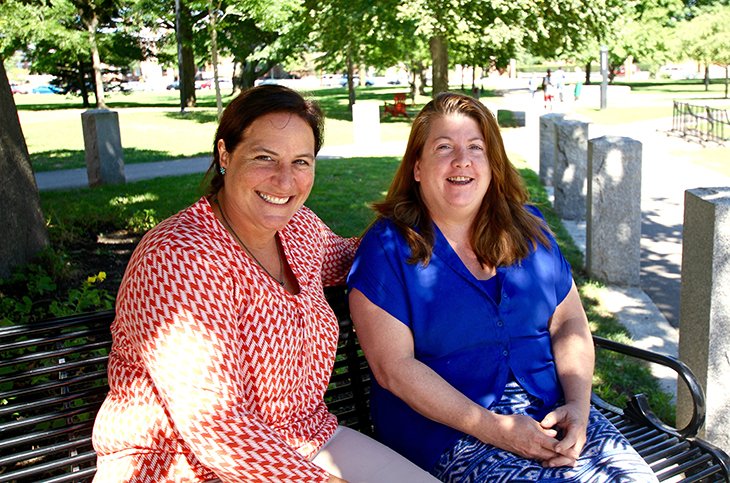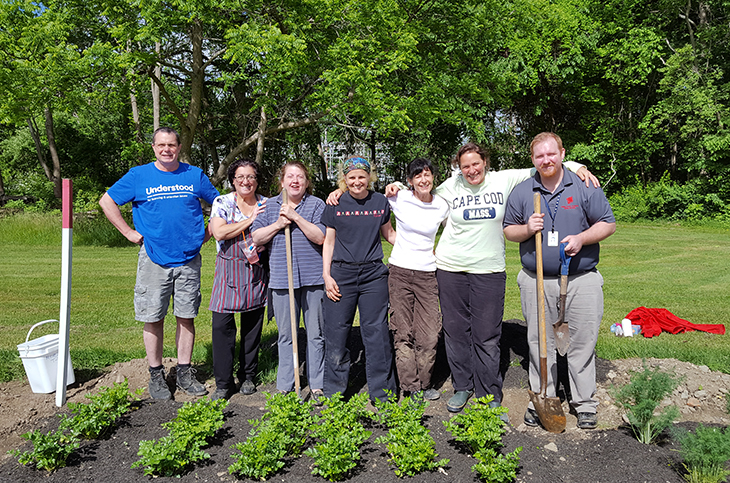Melinda Leonard and Heidi Dumont

“When you have that true passion for food, it pushes you to learn everything you can.”
“I wear this necklace every day as a reminder to be conscious and to lead by example,” says Heidi Dumont as she holds out a smooth, round pendant with these words etched into it: “Every morning we are born again. What we do today is what matters most.” As the dining services manager at Wetherell, one of Exeter’s two dining halls, Dumont’s actions have a direct impact on what Exonians eat and how they view the world of food. Melinda Leonard, acting director of dining services, brings a similar inspiration to her work, one that dates back to her childhood in the 70s, “when everything was about being green.”
For more than 20 years, Dumont and Leonard have used their experience and their focus on initiating a healthier and more sustainable dining environment to reinvent the way Exonians view breakfast, lunch and dinner.
“When you have that true passion for food, it pushes you to learn everything you can,” says Dumont. The pair have participated in Menus of Change, a collaboration of researchers, chefs and policy makers working to direct the mainstream food industry toward healthier and more sustainable choices, since its inception four years ago. Inspired by a variety of Menus of Change goals, Dumont and Leonard now serve less red meat, prepare more plant-based dishes, collaborate with local farmers and have added whole grains to the menu.
“It’s all about adding choices. Adding new, healthy ingredients students might never have heard of,” Leonard says. “Like quinoa, or kelp!” Dumont adds.
Under the pair’s guidance, Exeter has spearheaded the use of Leanpath, an innovative program focused on minimizing food waste, and was one of the first schools to purchase from Red’s Best, a Boston-based seafood company that distributes locally caught, under-fished species.
“We have our finger on the pulse, of staying aware and conscious of what’s happening in our world,” says Leonard. “We’re always thinking of the future — trying to find new ways to engage with our students, to educate, to make every level of dining better.”
This focus on a healthy food future has long roots for both women. “My great-great grandparents were farmers, and I think that does ingrain in you, maybe somewhere in your DNA,” says Dumont, who spends her days doing everything from troubleshooting inventory issues to training staff on a new recipe.
 “My fondest memories are going to camp and being surrounded by farm-fresh produce. There’s nothing like a beefsteak tomato right out the garden, or corn on the cob slathered in butter. It’s about the source. Good, clean food is just so good,” she adds.
“My fondest memories are going to camp and being surrounded by farm-fresh produce. There’s nothing like a beefsteak tomato right out the garden, or corn on the cob slathered in butter. It’s about the source. Good, clean food is just so good,” she adds.
“My family and I were foodies before the term existed,” explains Leonard, who supports every aspect of dining at Exeter – from planning events to managing finances. “Food was the centerpiece of our communication.”
The two women use an open door policy to stay engaged with students. “We really want to bring students into the bakery and the kitchen, and let them see what we do and voice any questions or concerns,” says Leonard.
“We had a student who had a lot of allergies. I remember his mother was worried that he wouldn’t ask any questions, because he was shy and very polite,” Dumont explains. The pair introduced him to the cooks and provided a tour of the kitchen. Eventually he developed a friendly relationship with the entire dining staff. “He’ll come up to ask questions all the time, or just to say hello,” Dumont says with a smile.
The pair meets with student council members once a month to discuss new plans and ideas. You’ll find them at the forefront of Exeter’s annual Climate Action Day, or collaborating with students on how to reduce food waste – known as the Zero Waste Initiative – or working with the Animal Rights Club. They’ve both made an array of student-driven ideas possible, ranging from sourcing and providing organic bananas to developing a review-based mobile app for dining services.
“You get really passionate students, and it works seamlessly with creating that balance between fun and food education,” says Dumont.
“This is the home of over 1,000 students. This is their kitchen table. Food is a common language with all of us,” says Leonard.
—Abby Perham
